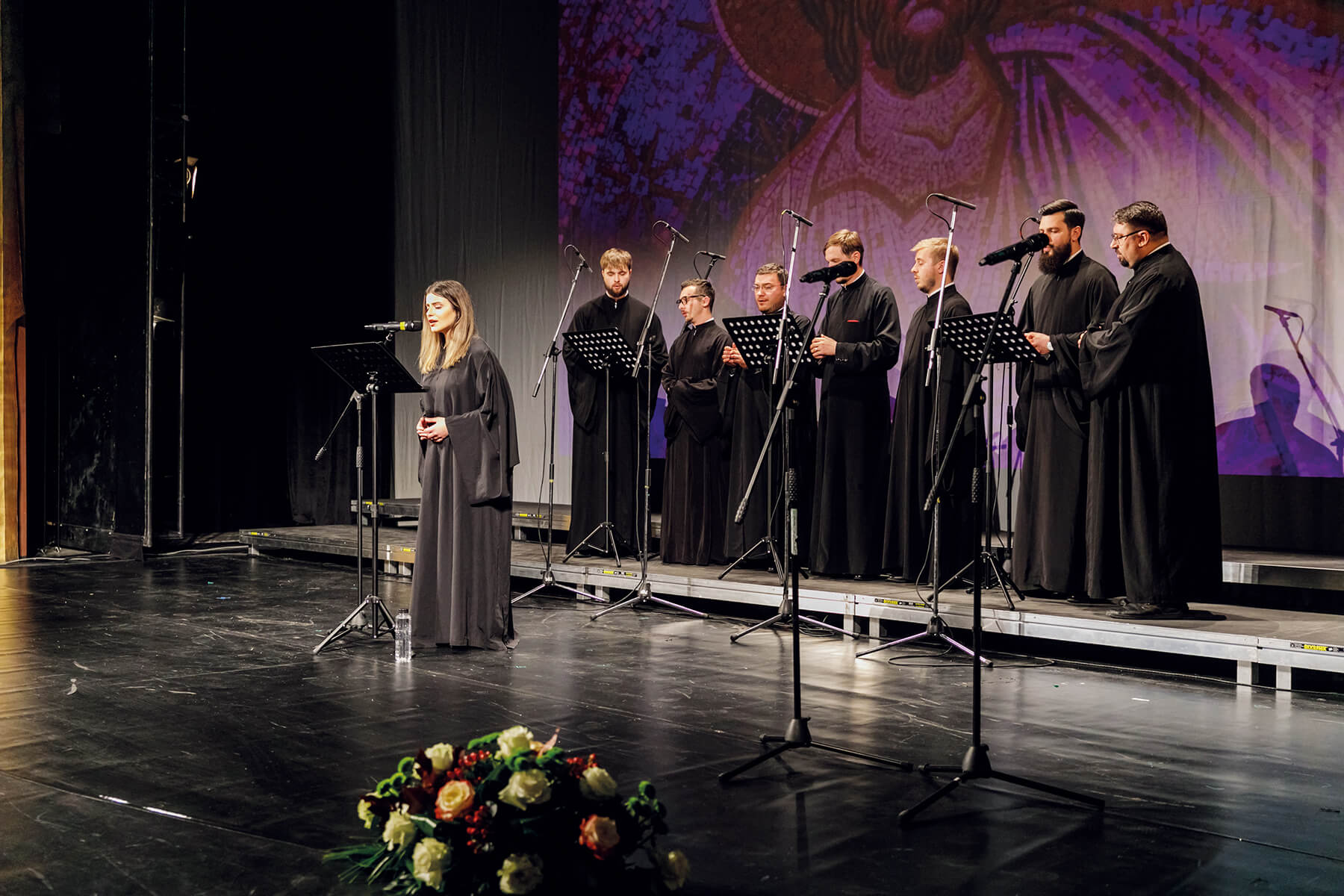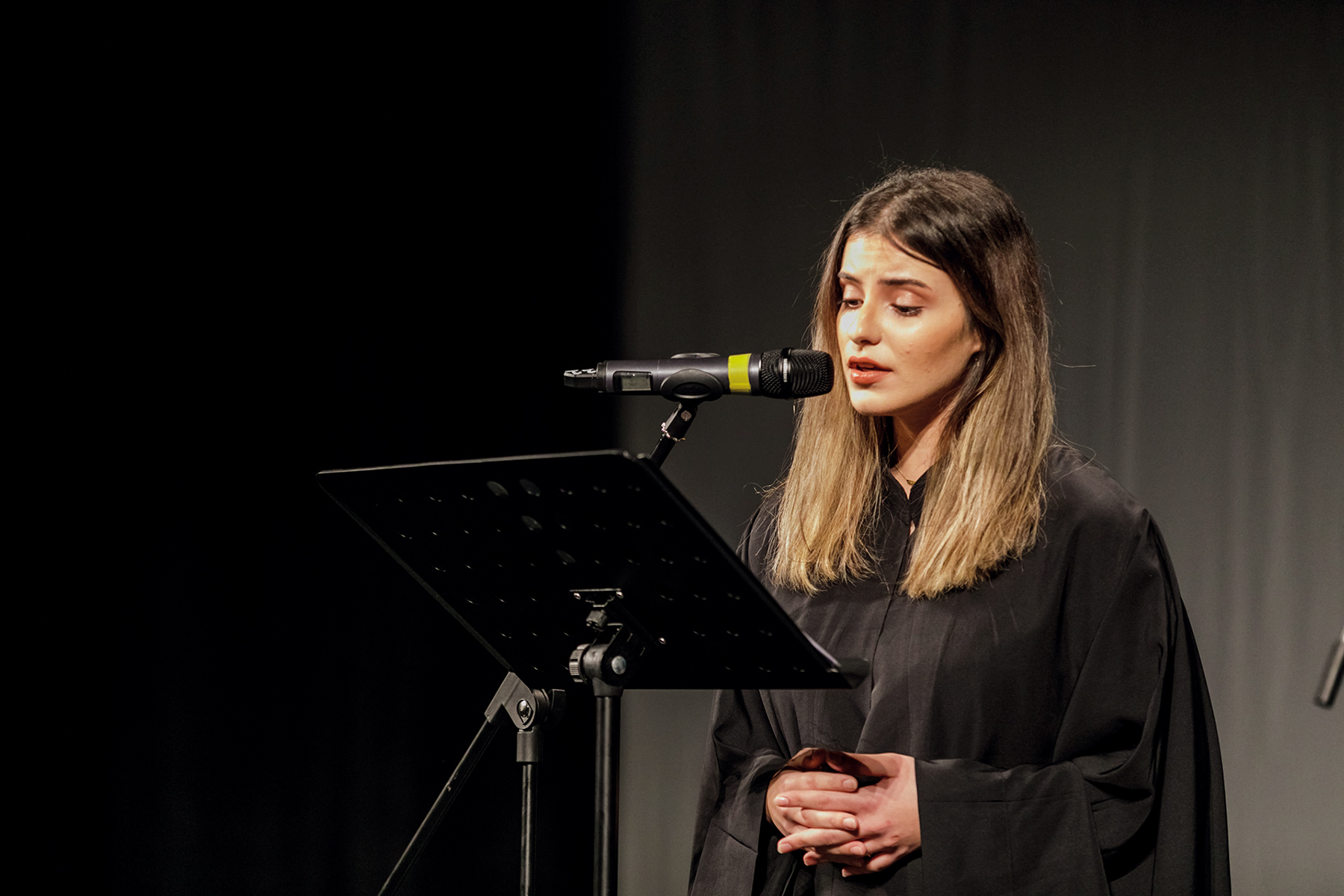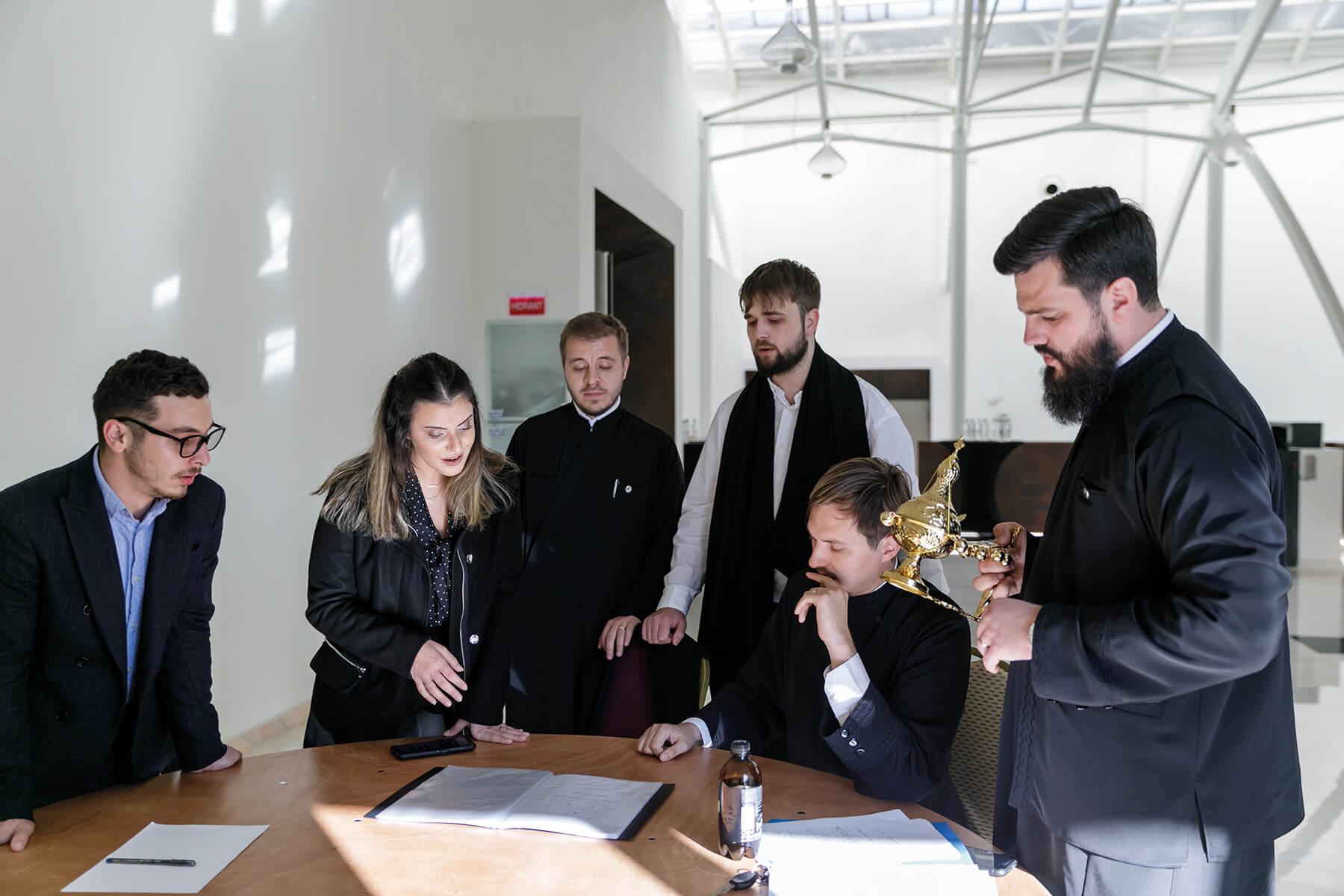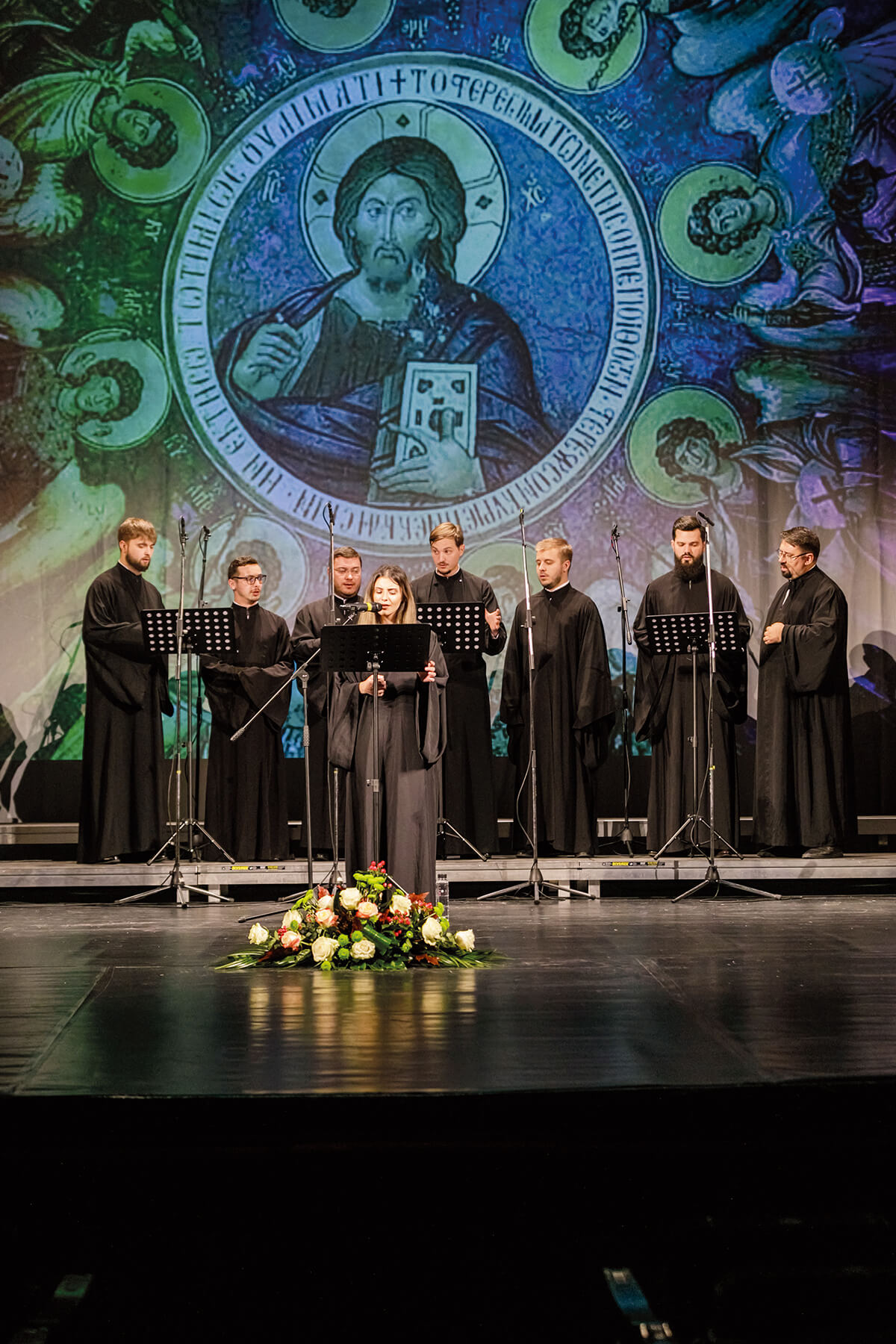„I was born in a family of musicians and have grown on this atmosphere surrounded by music. Together with my family, since I was little we would go together at the church where my father and brother sang in the choir. I was listening to psaltic music and I enjoyed it a lot. Then, I have started to sing this type of music myself. My parents have encouraged me to learn psaltic and oriental music. Today, at age of 22, I can openly admit that singing is a gift that I have received since I was a child and which I have tried my best to preserve and develop”. This is how briefly she characterizes herself Ribale Wehbe from Lebanon, to whom we are deeply thankful to having accepted to answer some of our questions.
What are the values that have guided you in life and how have you acquired them? What does attract you the most to Church?
Since childhood I went to church and felt that in there I can get closer to God and get familiar with His teachings. At Church one acquires a lot of useful values for his life, which he then starts to put in practice. He starts to learn how to work with humbleness, love and humanity. It goes without saying, education at home plays an essential role too! Nevertheless, for me, the fact that I like to sing has heavily attracted me to Church. So, two things essentially: psaltic music and the faith lived at home have lighted up my love for attending church.

What are the values that Church conveys to society?
Love, compassion, humility and communion. In Church there is this atmosphere of communion through prayer which positively impacts our social lives, if we manage to further transmit it. Through this, one can easily feel the needs of his neighbor and together live in peace. Of course, the word of the Holy Scriptures preached by the priest alongside its explanation play a profound role too. If we had followed the word of the Holy Scriptures and lived by it, we wouldn’t have ended up fighting wars. Church teaches us, first and foremost, to refrain ourselves from greed and acknowledge we cannot take absolutely anything from our earthly possessions with us in the afterlife.
How important the liturgical life in the development of a young man do you think it is?
It is important for one, ever since he is a child, to get in contact with Church’s life, because it gets way easier to grow these values inside his soul when he is a little. It turns out to be a more difficult task to achieve for teenagers, where the role of parents come into play. Parents need to have a certain „strategy”, as kindest as possible in order to be well received by youngsters. Then, the youngster can experience higher feelings of love and humanity, achieving a true communication and communion with the others.

How did you start singing in the church choir? How did you get into psaltic music? In Romania it is a bit bizarre for women to sing psaltic music, a music performed mainly by men.
I was going at church ever since I was very little and I used to sit in the stall and sang together with my fater and brother. I was attracted to psaltic music since very early. It helped a lot that God has given me this talent of singing. On this, I wish to recall an experience I lived when I was eight years old, with the Mount Lebanon choir which was called Sem and in which I sang. It is about a concert held by the Sem choir named „From generation to generation”, open for participation also to small children. There was an older soloist, a young one and a little one, and the little one was me. When I saw how much people enjoyed my singing and encouraged me, I felt I wanted to go further down this path. It has been a challenge for me, especially since we don’t have many women or girls that sing psaltic music. On the contrary, out there in the world there are plenty of girls or women who sing, although their number is not as high as the one of men. But I was helped to overcome this challenge because this is a gift of God.
I suppose singing psaltic music is just one of the other things you do in life. What are other activities in which you find yourself in, apart from psaltic music?
Indeed, there are other activities or areas of interest, but they all link to music. For example, I am a specialist in musicology. Music inspires me, so I teach oriental music and I enjoy quite a lot oriental and traditional songs, especially those that bear a certain message or instill certain feelings. Even during the time of pandemia, I have not interrupted this teaching activity. Even if all gatherings and public reunions were suspended for a while, I held many online courses and managed to have plenty of students from all around the world.
But I also teach to small children, aged between 3 and 5 years old, certain classes, to make them discover what type of music suits them best or enjoy the highest. It is called musical education or, better even, musical awareness. In Lebanon in particular, there are many people who send their children at this school, to get to know in the future what type of music suits them best. I teach music though play. It is a different type of music.
Are there any moments when you feel that life in Church gets tiresome or difficult?
I believe that some of the difficult moments a person goes through in life are not the ones spent in the Church, but outside the Church. The Church is our escape. In Church we call God and feel that we already belong to a different world. That is why it is very important for youngsters to attend church from early ages, because this will help them a lot throughout their entire life. The ones who go to church receive an education of possessing the spirit of kindness, and not of evilness. Through this mission, the Church eliminates or reduces a lot of problems in the world, because youngsters who do not attend church end up in many evils. To me, the difficult moments lay in the confrontation with people who do not go to church, both in meeting them and in arguing with them. It is very difficult to talk to people who do not understand spiritual life. It feels like a blockage.
What should the Church offer to young people so that they can join and feel part of the Church?
Our world is full of doubts. It is why, young people seek in Church foremost a peace and rest of their soul, in a world troubled by many questions and doubts. For me, what attracted me most were the activities we would run in the Church. I learned psaltic music in dedicated psaltic camps organized by the Church. We were going to monasteries and learned psaltic, but we would also engage in other activities and children games. Young people would like to spend a nice time in the Church and that is why, most often, the teachings of the Church must be transferred indirectly, through activities, and not necessarily through preaching, adapted to their level of training, to their age and by their liking. It is of utmost importance to transmit the word of the Holy Scripture in an accessible, practical and widely understandable way.
From your point of view, how is faith lived in Lebanon as compared to Romania?
I have visited Romania eight times and soon it will be the ninth. Faith is alive in both Romania and Lebanon. A lot of people go to church and attend the service. I did not find any significant differences in this respect. Perhaps the difference is that we, Christians Orthodox in Lebanon are a minority. And although we are a minority, this does not affect our church life. We normally go to church, attend its service and have no problem or political tension in this regard. In Romania, the culture is very deeply rooted in tradition. In Lebanon, however, this is not the case. For instance, I noticed when listening to carols in Romania, most often they instill this warm church atmosphere, sometimes even psaltic. On the other hand, we don't really have this atmosphere that carols convey in Romania. In our country, carols are distant from the Byzantine or choral tradition, because they are influenced by several Christian sects and denominations.
How did you discover Romania and its people?
Romania is my second home. I care a lot about the Romanian people and feel we are alike. I also like the country quite a lot because my first international concert was held in Romania, at Brașov. Romanians are very generous and we are very similar in this regard.

What would you say to a youngster?
To love God unconditionally, to have trust in the message that the Church wishes to convey and to receive an education focused on church values. This is the only way we can succeed to remove all problems and wars that we are going through. At the end of the day, nothing earthly accompanies us into eternity. And for young people who have talent and want to serve God through it, I encourage them and tell them that there is nothing more beautiful in life than to serve God through your talent, through the gift God has entrusted you with.



